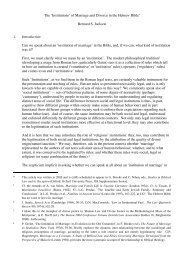Here - Deborah Charles Publications
Here - Deborah Charles Publications
Here - Deborah Charles Publications
Create successful ePaper yourself
Turn your PDF publications into a flip-book with our unique Google optimized e-Paper software.
- 16 –Amy BirkanAmy Birkan (Hebrew University of Jerusalem), Autonomy in Talmudic Law and Its Limitation of the Scope of Victimhood(Session 4C)This paper will present a general theory of Autonomy as it is exemplified through Talmudic Legislation, and explore the manner inwhich this doctrine narrows the parameters of victimhood in Talmudic law. The theory of Autonomy will developed throughrulings in cases of Tort and Criminal law, with special attention paid to the victim’s substantive duty to actively avoid beingharmed by dangerous conditions created by the defendant. Rulings in cases of ‘Enticement,’ and ‘Psycho-Emotional Distress’ willbe used to illuminate the conception of a Bar Daat, and the Talmudic notion that an individual is legally deemed Autonomous, andthe sole agent responsible for her deeds.Amy Birkan is currently finishing her Doctorate in the Department of Jewish Thought at the Hebrew University ofJerusalem. She is writing her dissertation on ‘Autonomy on Talmudic Law and Its Limiting Effect on Victimhood.’ Amyholds an M.A. from McGill University in Biblical Interpretation and a B.A. from Bar Ilan University in Talmud andBible.Leah Bornstein-MakovetskyLeah Bornstein-Makovetsky (Ariel University Center) – Punishment for Adultery in the Jewish Society in the Ottoman Empire(Session 11A)Dozens of sources from many Jewish communities in the Ottoman Empire, during the 16th-19th centuries, mostly Responsa,lists of Gittin, and minutes books of rabbinical courts in Istanbul deal with halakhic questions of adulterous women. Although themajority of Muslim scholars during the middle Ages agreed on the death penalty ( by stoning) on adulterous Muslim women - Ifthere were four witnesses, and ordered to enforce Islamic law in every adultery by Christian and Jewish subjects. On the other handthere were other Muslim scholars who opposed the death penalty in adultery cases by non-Muslims. They viewed that punishmentfor adultery is perceived as interference in matters of religion of the Jewish community.From the 16th century onward the Ottoman Law ruled in every case of adultery by Muslim, Christians and Jewish subjects, andthe penalty was one hundred lashes for every adulterous man and woman. The adulterous man had to pay also a fine and inaddition was banned for a year. Sometimes the guilty man and woman were also expelled from the city by the Ottoman ruler of theregion. This ruler (Pasha,Vali) sometimes held them in prison until their fault was proved.Generally Jewish society and the communal Jewish leaders actually made great efforts to hide adultery cases of Jews from theeyes of the authorities. They wanted to prevent the severe punishment which was imposed on the fornicators and hurt themphysically and sometimes bring them to conversion to Islam.It was also very important to the Jewish society to be perceived as a moral society.One gets the impression that the Jewish society managed to keep secret the majority of cases of adultery and be content withdeporting the woman from her husband. However sometimes the Jewish court of law was forced to inform the Ottoman authoritiesabout the adultery cases, causing the offenders to be arrested. There were large communities, such as Salonica, Istanbul and Safedthat occupied a special court of "Berurei Averot" that imprisoned adulterers in jail for a while, and brought the Jewish courts toarrange divorce for adulterous women.Sometimes the Ottoman ruler ordered the Jewish husband to divorce his adulterous wife in Muslim court, and later he orderedhim to divorce his wife in the Jewish court of law.However, sometimes there were Jews who insisted to surrender the adulterous man to the Ottoman authorities, in order to causehim severe punishment.Generally the halakhic posekim in the Ottoman Jewish communities rejected such step and only imposed fines on the offenders.The lecture will discuss the Ottoman punishment system for adultery and its implementation in Jewish Society. It deals also withthe pressure to punish adulterers according to Ottoman law, and the approaches of the Jewish deciders in that issue.The discussion relates also to social and economic aspects of Jewish society in the Ottoman Empire during the 16 th -19 th century.Leah Bornstein-Makovetsky is Associate Professor at the Israel Heritage Department, University Center of Ariel. Shegraduated Bar Ilan University and has taught in this institution Jewish History in the years 1971-2003. Her articles (more than100 articles) deal with a variety of subjects related to the history of the Jews in the Ottoman Empire during the 16 th -19 th





